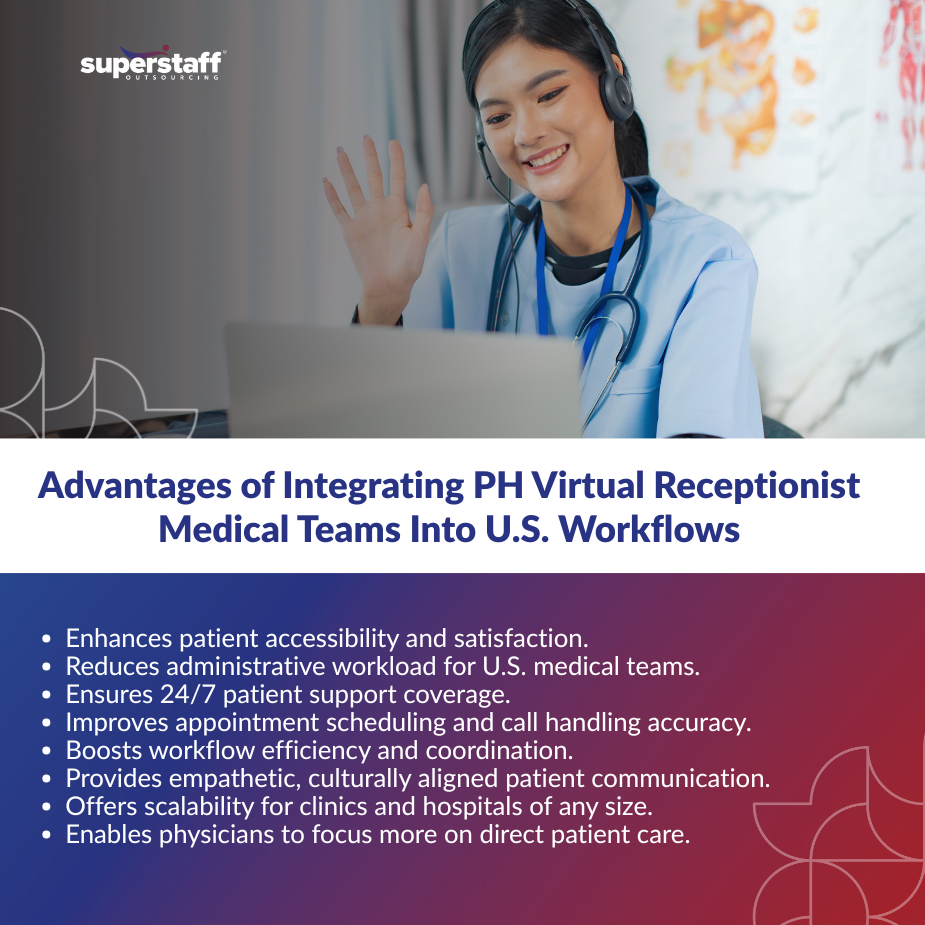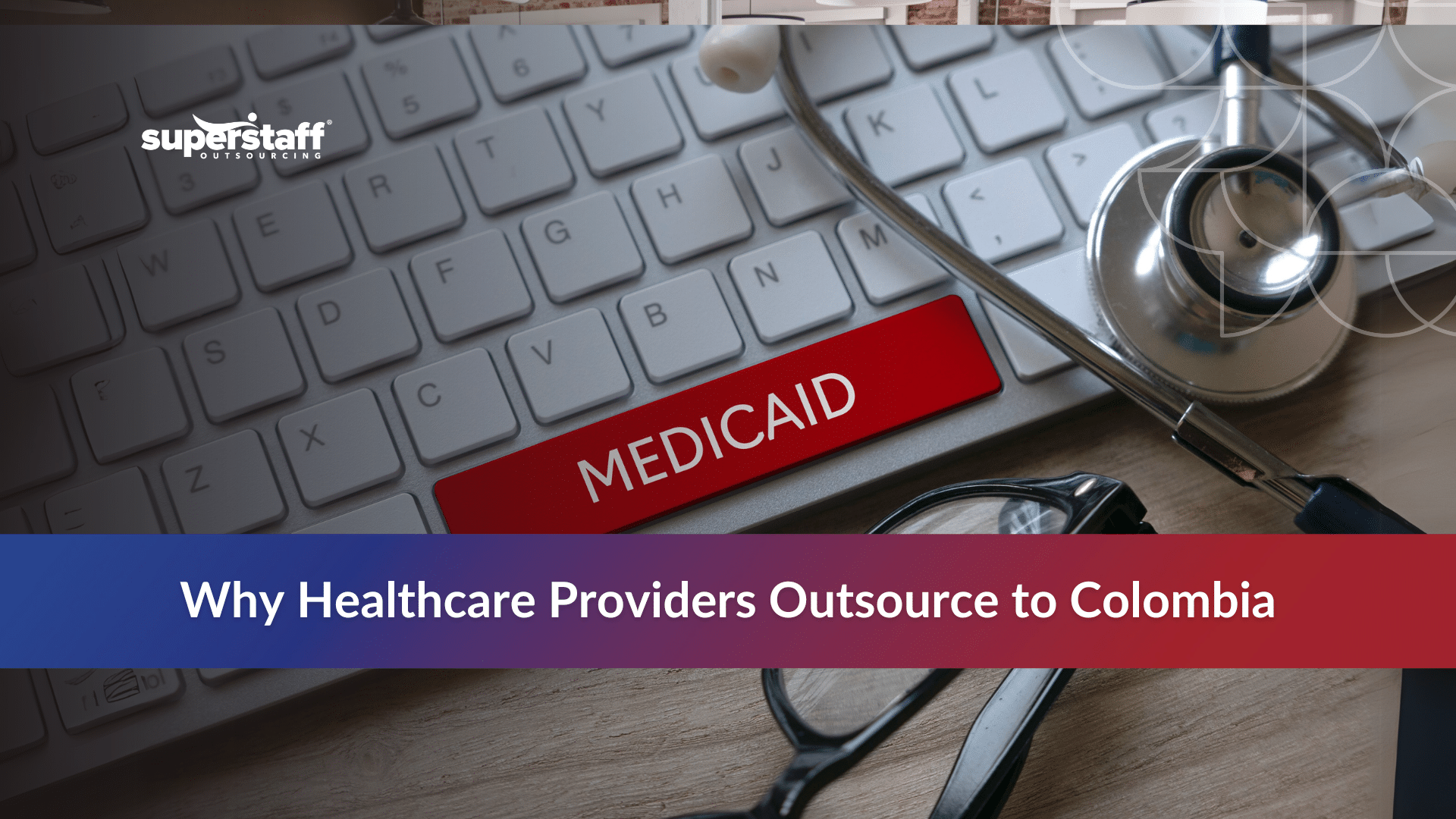
In today’s hybrid healthcare model, speed, empathy, and efficiency define patient satisfaction. The modern patient expects accessible care and human-centered service that feels both personal and immediate. However, many U.S. clinics and hospitals struggle to meet this expectation due to staffing shortages and administrative overload.
The surge in telehealth and digital-first patient engagement has pushed medical facilities to rethink their front-office operations. This is where virtual receptionist medical solutions from the Philippines come into play—bringing structure, empathy, and reliability to the patient experience. These offshore professionals act as the first point of contact, blending cultural warmth with administrative precision to support busy medical practices.
This blog explores how integrating Philippine-based virtual receptionists creates a hybrid care system that enhances accessibility, patient trust, and workflow coordination. It aims to show healthcare decision-makers how offshore teams can fill communication gaps, strengthen continuity of care, and improve administrative efficiency while maintaining compliance and compassion.
The Evolution of Hybrid Healthcare Teams in a Digital Era
The healthcare sector has entered a transformative phase. The fusion of traditional in-person care with remote administrative and digital support has given rise to the hybrid care model—a structure that allows medical practices to serve patients efficiently without losing the personal touch.
Hybrid care combines on-site medical expertise with offshore administrative and communication support. As telehealth expands and virtual appointments become commonplace, virtual receptionist medical roles have grown indispensable.
After the pandemic, healthcare facilities discovered the value of remote teams that could handle scheduling, triage calls, insurance verification, and patient intake—freeing clinical staff to focus on direct care. At the same time, the Philippines has emerged as a trusted global hub for healthcare outsourcing. With its strong education system, high English proficiency, and deep service culture, the country became a natural choice for medical virtual receptionist services.
This shift creates the foundation for a modern hybrid care model—one that integrates Philippine-based professionals into patient-facing roles and complements the strengths of U.S.-based medical teams.
What Philippine Virtual Receptionists Bring to the Healthcare Frontline
A virtual receptionist medical role requires more than just administrative skill. It demands empathy, attention to detail, and cultural alignment with patients. Filipino professionals excel in these areas, making them valuable extensions of U.S. healthcare teams.
Philippine virtual receptionists bring a blend of professionalism and compassion that resonates with American patients. Their cultural warmth helps patients feel heard, while their training ensures accuracy in managing sensitive medical data.
Key strengths include:
- Strong English proficiency and empathy: Filipino agents naturally communicate in a friendly, patient-centered tone, which is crucial during stressful medical interactions.
- Healthcare expertise: Many have experience in hospital administration or medical billing, making them familiar with clinical workflows.
- HIPAA compliance training: They adhere to U.S. data protection and privacy standards, maintaining patient trust.
- Cost-efficient operations: Philippine labor costs allow healthcare providers to extend their support hours or offer 24/7 coverage without overextending budgets.
These strengths position Filipino virtual receptionists as reliable partners in enhancing patient interactions, improving workflow reliability, and helping clinics maintain the delicate balance between empathy and efficiency.

How Virtual Receptionists Fit into U.S. Medical Workflows
Integrating offshore receptionists is not about replacing existing staff but extending their capabilities. A virtual receptionist medical professional can be smoothly aligned with a U.S. clinic’s daily operations through system integration, clear communication, and workflow mapping.
Successful integration typically involves:
- Technology Alignment: Virtual receptionists connect with Electronic Health Record (EHR) or Electronic Medical Record (EMR) systems like Epic or Athenahealth. They handle scheduling through tools such as Zocdoc, Google Calendar, or in-house patient management software.
- Cross-Team Coordination: These professionals communicate with nurses, billing specialists, and care coordinators to ensure seamless patient handoffs.
- Real-Time Responsiveness: In urgent cases, they quickly escalate calls or messages to on-site teams based on established protocols.
For decision-makers wondering how to integrate virtual medical receptionists into U.S. clinics, the process involves three key steps: onboarding, technology setup, and process synchronization. Once these are in place, clinics benefit from smoother patient communications and reduced administrative strain.
The result is a hybrid model that allows physicians and nurses to focus on clinical priorities while the virtual team ensures that every patient call, inquiry, or follow-up is handled with care and precision.
Streamlining Patient Communication and Administrative Workflows
In healthcare, the first interaction often defines the patient’s trust in a provider. A virtual receptionist medical team ensures that every call, message, or appointment request is handled promptly and empathetically.
From appointment scheduling and insurance verification to managing follow-ups, these professionals streamline administrative workflows that typically slow down medical offices. Here’s how they create impact:
- Appointment Scheduling: They manage calendars across multiple physicians, optimizing patient flow and reducing missed appointments.
- Insurance Verification: They handle pre-authorization and coverage checks, ensuring patients know their benefits before consultations.
- Patient Intake and Data Entry: They collect patient information and update medical records before visits.
- Reduced Call Abandonment: With round-the-clock availability, patients no longer wait endlessly on hold.
- Multilingual Communication: Many Philippine receptionists can assist in Spanish or other languages, accommodating diverse patient bases in the U.S.
These virtual professionals handle repetitive yet essential administrative tasks with efficiency, freeing clinical teams to focus on direct patient care. By bridging communication gaps, healthcare virtual assistants from the Philippines transform patient interactions into seamless, caring experiences that feel both personal and efficient.
Ensuring Compliance, Privacy, and Data Security
Trust is the foundation of healthcare. Patients expect their personal information to be protected at all times. Integrating a virtual receptionist medical team requires strict adherence to privacy regulations, including HIPAA and U.S. healthcare data protection laws.
Top outsourcing providers ensure compliance through:
- Secure data handling: All communication and patient information are transmitted through encrypted channels.
- Strict access control: Only authorized personnel can view or update medical records.
- HIPAA-certified training: Every outsourced medical receptionist undergoes specialized compliance training to safeguard patient confidentiality.
- Infrastructure security: Data centers comply with ISO and GDPR certifications, providing global-standard protection.
Partnering with outsourcing firms that meet international security standards not only ensures patient trust but also protects the clinic’s reputation and legal standing. With compliance assured, healthcare organizations can confidently scale their virtual support structures and focus on quality care.
Operational and Financial Benefits of a Hybrid Care Model
The hybrid care approach offers healthcare providers the best of both worlds—high-quality patient service and operational efficiency. The virtual receptionist medical model is not simply a cost-cutting solution; it’s a growth strategy.
Key benefits include:
- Reduced Overhead Costs: Offshore virtual teams eliminate expenses related to office space, benefits, and local hiring.
- Increased Productivity: On-site teams can redirect attention from administrative work to patient care and clinical outcomes.
- Scalable Staffing: Clinics can easily add or reduce virtual staff based on patient volume or seasonal demand.
- Improved Patient Satisfaction: With round-the-clock coverage, patients enjoy faster responses and better service continuity.
Financially, this model offers a clear ROI. A small clinic can operate with the responsiveness of a large facility—without the financial burden. Operationally, the integration of medical virtual receptionist services improves appointment accuracy, reduces no-show rates, and streamlines the billing process.
These benefits demonstrate that virtual receptionists are more than a support solution—they are a strategic extension of the medical team, enabling sustainable growth and operational resilience.
Real-World Examples of Integration Success
Across the United States, healthcare providers are proving how effective the virtual receptionist medical model can be.
- Small Clinics: Independent practitioners and family doctors use virtual receptionists to handle after-hours calls and appointment requests, increasing accessibility without hiring in-house night staff.
- Specialty Practices: Dentists, dermatologists, and physical therapists use virtual receptionists for patient follow-ups and insurance coordination, ensuring consistency in administrative processes.
- Hospitals and Multi-Location Groups: Larger institutions use offshore receptionists to handle overflow calls, manage centralized scheduling, and provide multilingual support.
For example, one multi-site healthcare network integrated a healthcare virtual assistant Philippines team to manage patient intake across different time zones. Within three months, they reported a reduction in missed calls and an increase in patient satisfaction scores.
Such results reinforce that outsourcing is not just about efficiency; it’s about enhancing patient experience while optimizing clinical workflows. The growing number of success stories shows that the hybrid care model is not a passing trend but the future of healthcare delivery.
Building a Seamless Partnership with an Outsourcing Provider
The success of any hybrid care model depends on choosing the right partner. A trusted BPO offering the best virtual receptionist services for healthcare providers understands the balance between technical integration, compliance, and human connection.
When building this partnership, U.S. healthcare leaders should focus on:
- Experience and Expertise: Choose an outsourcing provider with a proven track record in healthcare operations and compliance.
- Service Level Agreements (SLAs): Establish clear expectations for response times, escalation procedures, and patient interaction quality.
- Training and Cultural Alignment: Ensure that the offshore team receives continuous training in brand voice, communication tone, and patient empathy.
SuperStaff, for instance, has extensive experience in healthcare support services. Its teams of outsourced medical receptionists are trained in U.S. healthcare workflows and EHR systems, offering a turnkey solution for clinics ready to scale patient-facing operations.
With the right provider, U.S. medical teams gain dependable front-line support that enhances both patient satisfaction and operational efficiency.
Connect With SuperStaff for Virtual Receptionist Medical Services
Integrating Philippine virtual receptionist medical services allows U.S. healthcare providers to build truly hybrid care teams that balance empathy, compliance, and efficiency. These professionals act as the bridge between patients and clinical teams, delivering timely communication, organized workflows, and compassionate service.
From seamless technology integration to airtight data protection, offshore receptionists enable healthcare organizations to achieve measurable improvements in patient satisfaction and operational performance.
As healthcare continues to evolve toward a hybrid model, now is the time to invest in virtual support solutions that ensure continuity, scalability, and human connection.
Partner with SuperStaff to create your hybrid care model—where world-class Philippine talent meets compassionate, efficient U.S. healthcare service delivery.






